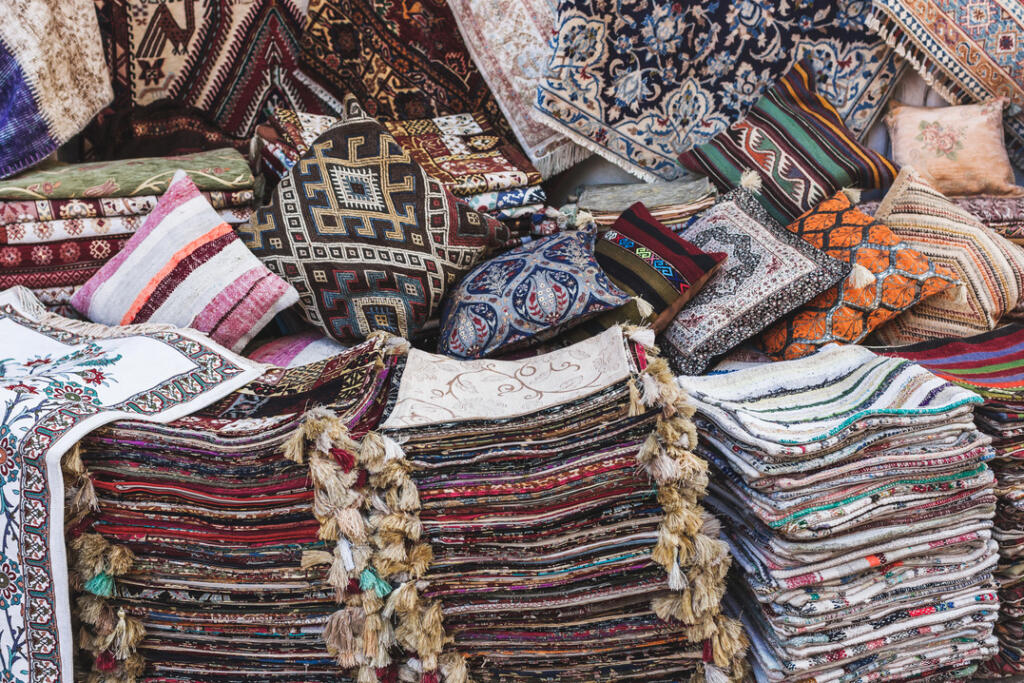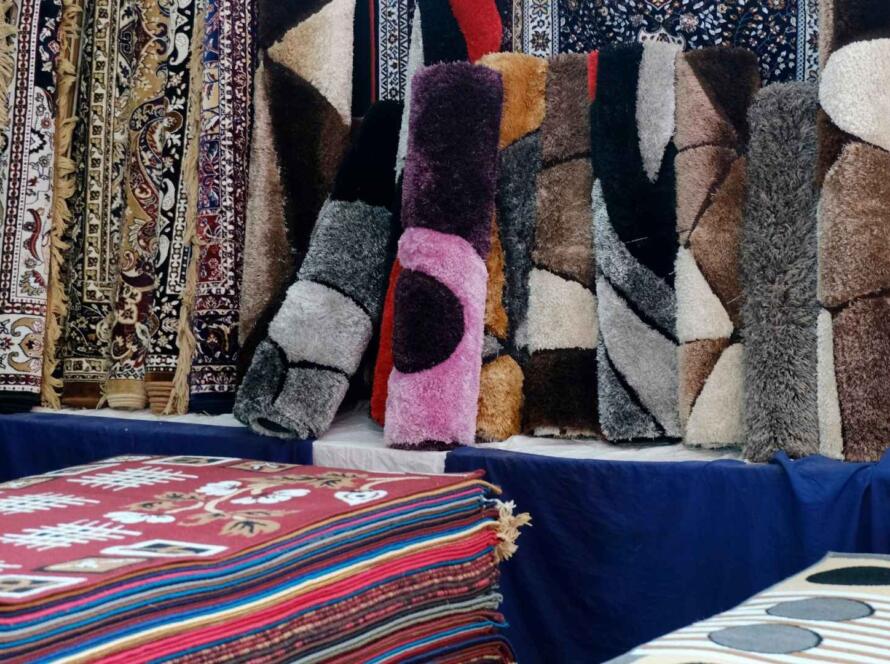Indian carpets have long been admired for their exceptional craftsmanship and unique designs. Whether for home interiors, offices, or large commercial spaces, Indian carpets are known for adding elegance and warmth to any setting.
If you’re looking to place bulk orders for Indian carpets, choosing the right carpet manufacturer is crucial for ensuring quality, timely delivery, and long-term partnerships.
With increasing demand for eco-friendly and sustainable carpets, many businesses are now focusing on finding manufacturers who offer high-quality yet sustainable options.
This blog will help you understand what to look for when choosing an Indian carpet manufacturer for bulk orders, especially in the context of growing trends toward sustainable carpets.
Why Choose Indian Carpets?
Indian carpets have a rich history that dates back centuries, making them a symbol of artistry and luxury. India is one of the largest exporters of hand-knotted rugs and machine-made carpets, and the country has earned a reputation for producing carpets with unmatched craftsmanship. When selecting Indian carpets for bulk orders, you’re investing in products that are globally recognized for their:
- Exceptional craftsmanship: Skilled artisans who work meticulously on each piece.
- Durability: High-quality materials like wool and silk ensure that Indian carpets last for decades.
- Aesthetic appeal: Unique designs, patterns, and color schemes make Indian carpets stand out in any interior.
- Affordability: Despite their quality, Indian carpets are often more affordable compared to carpets from other regions.
In addition to their beauty and quality, Indian carpets offer long-term value, making them a smart investment for bulk buyers like interior designers, architects, and retailers.
Key Factors to Consider When Choosing an Indian Carpet Manufacturer
When placing bulk orders for Indian carpets, it’s essential to choose the right manufacturer to ensure that the process is smooth and that you receive top-quality products. Here are some critical factors to consider:
- Quality of Materials: Ensure the manufacturer uses high-quality, durable materials such as wool, silk, or eco-friendly fibers like jute and cotton.
- Experience and Expertise: A manufacturer with years of experience will have better control over quality, design trends, and bulk order requirements.
- Manufacturing Capabilities: Make sure the manufacturer can handle large-scale production while maintaining quality standards.
- Sustainability Practices: Choose a manufacturer that follows eco-friendly practices, such as using non-toxic dyes and natural fibers.
- Certifications and Industry Standards: Look for certifications like ISO, GOTS, or GoodWeave, which guarantee ethical and sustainable manufacturing.
One prime example of a manufacturer excelling in these areas is Shivalika Rugs, a fully integrated entity with a huge production facility in Panipat. Their commitment to sustainability, innovation, and quality ensures that all aspects of the manufacturing process—from cutting, stitching, and tufting to lamination and quality control—are conducted with a focus on environmental harmony.
Sustainability in Indian Carpets
With growing environmental awareness, many businesses are prioritizing sustainability when choosing products. Sustainable carpets are made using eco-friendly materials and processes that minimize environmental impact. Indian manufacturers, including Shivalika Rugs, are embracing sustainable methods to meet this demand.
When looking for a sustainable carpet manufacturer, consider:
- Eco-friendly materials: Natural fibers like wool, cotton, jute, and bamboo are renewable resources often used in sustainable carpets.
- Non-toxic dyes: Many manufacturers use plant-based or low-impact dyes to avoid harmful chemicals.
- Water and energy-efficient production: Manufacturers with water recycling systems and energy-saving technologies help reduce the carbon footprint.
We exemplifies this approach by integrating sustainability into their production cycle, ensuring eco-friendly practices without compromising on quality or aesthetic appeal.
Benefits of Sustainable Carpets:
- Lower environmental impact.
- Healthier indoor air quality due to the absence of toxic chemicals.
- Supporting ethical labor practices and fair wages.
By choosing a sustainable carpet manufacturer, you’re not only investing in high-quality carpets but also supporting environmentally responsible practices.
Assessing the Indian Manufacturer’s Product Range
A versatile and experienced carpet manufacturer should offer a wide range of products. When evaluating a manufacturer’s product range, consider the following:
- Carpet types: Does the manufacturer offer hand-knotted, machine-made, and tufted carpets? Having a variety of options will help cater to different project needs.
- Customization options: Customization is crucial for bulk orders, especially for commercial or luxury settings. Shivalika Rugs offers customization in terms of colors, designs, patterns, and sizes, allowing clients to personalize their carpets to meet specific requirements.
- Previous work: Review the manufacturer’s catalog and past projects to assess the diversity and quality of their work.
By ensuring the manufacturer offers a wide selection of Indian carpets and customization options, you can guarantee they’ll meet the unique needs of your project.
Understanding Manufacturing and Delivery Timelines
For bulk orders, keeping track of production schedules and delivery timelines is crucial. To avoid delays, ask the following questions:
- What is the estimated lead time?
Manufacturing bulk orders takes time, and it’s important to know how long the manufacturer will take to complete and deliver your order. - How do they handle rush orders?
If you’re working with tight deadlines, you need a carpet manufacturer that can accommodate rush orders without compromising on quality. - Are they transparent about their process?
Clear communication and transparency are vital. Make sure the manufacturer provides regular updates on production progress and delivery timelines.
Pricing and Value for Money
While pricing is always a consideration, it’s important to remember that with carpets, you often get what you pay for. When placing bulk orders, you’ll want to strike a balance between affordability and quality.
Key considerations when evaluating pricing:
- Cost per square foot: Compare the cost per square foot or meter for different types of Indian carpets (hand-knotted, machine-made, etc.) and assess if the price matches the quality.
- Bulk discounts: Many manufacturers offer discounts for large orders. Be sure to ask about bulk pricing and negotiate favorable terms.
- Longevity and durability: Higher-quality materials might come with a higher price tag, but they offer long-term value by Providing rugs that lasts longer and requiring less maintenance.
Choosing a manufacturer that offers competitive pricing without compromising on quality will ensure that your investment in Indian carpets is worthwhile. standards, making it an excellent option for bulk buyers.

How to Evaluate Customer Service and Support
While pricing is always a consideration, it’s important to remember that with carpets, you often get what you pay for. When placing bulk orders, you’ll want to strike a balance between affordability and quality.
Key considerations when evaluating pricing:
- Cost per square foot: Compare the cost per square foot or meter for different types of Indian carpets (hand-knotted, machine-made, etc.) and assess if the price matches the quality.
- Bulk discounts: Many manufacturers offer discounts for large orders. Be sure to ask about bulk pricing and negotiate favorable terms.
- Longevity and durability: Higher-quality materials might come with a higher price tag, but they offer long-term value by lasting longer and requiring less maintenance.
Choosing a manufacturer that offers competitive pricing without compromising on quality will ensure that your investment in Indian carpets is worthwhile. Shivalika prides itself on maintaining strong relationships with its clients, providing excellent communication and support throughout the process, ensuring a smooth experience from start to finish.
The Role of Certifications in Indian Carpet Manufacturing
Certifications are a vital indicator of a manufacturer’s commitment to quality and ethical practices. They ensure that the manufacturer follows industry standards and that their products meet global expectations. Some important certifications to look for include:
- ISO certification: This signifies that the manufacturer adheres to international quality management standards.
- GoodWeave certification: Ensures that the carpets are made without child labor and under ethical working conditions.
- GOTS (Global Organic Textile Standard): Certifies that the manufacturer uses organic materials and follows sustainable manufacturing practices.
Checking for these certifications before placing a bulk order gives you confidence in the quality and ethical standards of the manufacturer.
Conducting Factory Audits and Site Visits
If possible, visiting the manufacturer’s facility is one of the best ways to ensure that they meet your expectations for quality, capacity, and sustainability. A factory audit can reveal a lot about the company’s manufacturing capabilities and standards. Here are key areas to inspect:
- Production facilities: Check the equipment and technology used in manufacturing to assess whether they can handle your bulk order.
- Workforce conditions: Ensure that the workers are treated fairly and that labor practices are ethical.
- Quality control processes: Review how the manufacturer tests and inspects carpets during production.
If site visits are not feasible, request detailed information about the factory or arrange a virtual tour to gain insights into their production practices.
Managing Logistics and Shipping for Bulk Orders
Efficient logistics are key for bulk carpet orders. Evaluate the manufacturer’s ability to manage shipping by considering:
- International shipping expertise: Ensure they have experience handling international orders and customs processes.
- Packaging standards: Carpets must be packed to avoid damage during transit.
- Handling delays: Ask how the manufacturer addresses potential delays in the supply chain.
Building Long-Term Partnerships with Indian Carpet Manufacturers
Establishing long-term relationships with a reliable Indian carpet manufacturer can offer several benefits:
- Better pricing: Manufacturers often provide better rates for repeat customers and long-term partners.
- Priority on orders: Manufacturers tend to prioritize bulk orders from trusted partners, ensuring you get your products on time.
- Consistency in quality: A strong working relationship helps ensure that the manufacturer consistently delivers the quality you expect.
To maintain a good relationship, ensure regular communication, provide feedback, and negotiate long-term terms that benefit both parties.
Conclusion
Choosing the right Indian carpet manufacturer for bulk orders requires careful consideration of various factors, such as quality, sustainability, pricing, and customer support. By focusing on manufacturers like Shivalika Rugs, who have a proven track record of quality and eco-friendly practices, you can ensure that your investment in Indian carpets is both valuable and responsible.
A long-term partnership with a reliable manufacturer will guarantee consistent quality, timely deliveries, and better pricing for future orders, making it a smart choice for businesses and bulk buyers alike.




